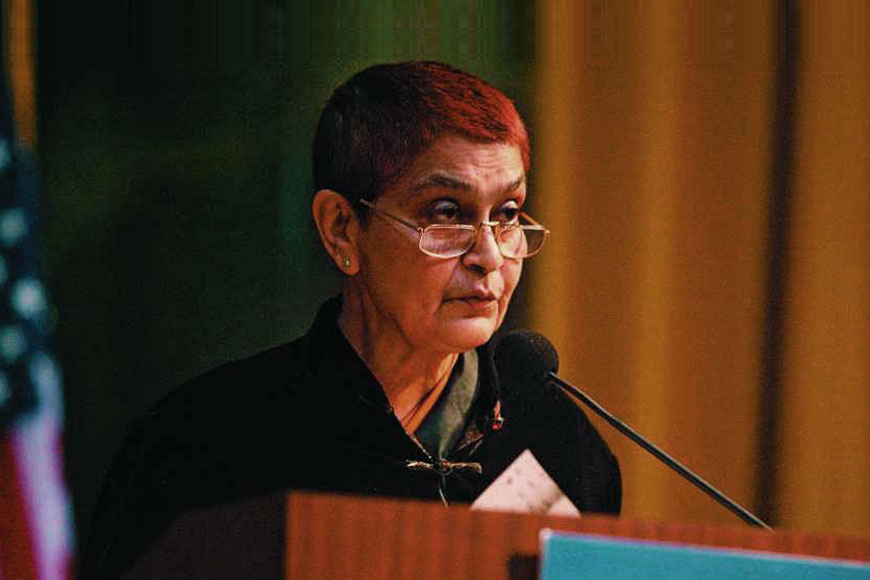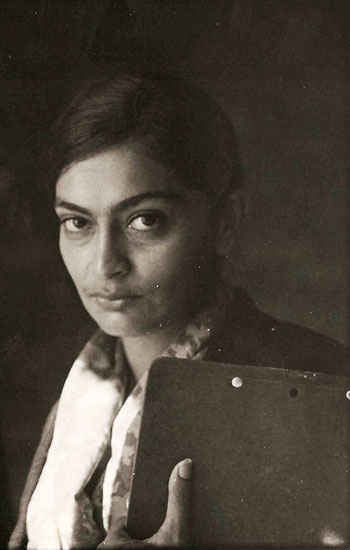‘Can the Subaltern Speak?’ -- golden question by Gayatri Chakravorty Spivak

‘Can the Subaltern Speak?’ An essay that had a big impact on postcolonial intellectualism and one that catapulted Gayatri Chakravorty Spivak to a new academic high. Considered as one of the most influential postcolonial intellectuals, Spivak had raised a pertinent question that was somewhat path-breaking --- the lack of an account of the Sati practice, leading her to reflect on whether the ‘subaltern’ can even speak. She writes about the process, “the focus on the Eurocentric subject as they disavow the problem of representation; and by invoking the Subject of Europe, these intellectuals constitute the subaltern Other of Europe as anonymous and mute.”
Spivak’s pen was indeed mightier than the sword. Born on February 24, 1942 in Kolkata, she was raised in a highly academic environment and no wonder imbibed the knowledge to become one of the greatest Indian literary theorist and professor of Comparative Literature noted for her personal brand of deconstructive criticism, also known as ‘interventionist.’ She came from an illustrious family of Bengal and her great grandfather, Pratap Chandra Majumdar, was Sri Ramkrishna Paramhansa’s doctor. Her father Paresh Chandra Chakrabarti was given diksha by none other than Sri Sarada Devi.
 After completing her secondary education from St John’s Diocesan, she went to Presidency College and then to University of Cambridge and Cornell. She taught English and Comparative Literature at the Universities of Iowa, Texas, Pittsburgh and Columbia University. However, she rose to prominence with her translation of French deconstructionist philosopher Jacques Derrida’s De la grammatologie, which included a translator’s introduction that has been described as ‘setting a new standard for self-reflexivity in prefaces.’ She also carried out a series of historical studies and literary critiques of imperialism and international feminism. She has often been referred to as a ‘practical Marxist-feminist-deconstructionist.’ She pioneered the study in literary theory of non-Western women and produced one of the earliest and most coherent accounts of that role available to the world. In a series of later essays, Spivak urged women to intervene in the evolution of deconstructive theory. She also urged her colleagues to focus on women’s historicity. Critical of imperialist as well as Marxist historical interpretation, Spivak accused ‘bourgeois Western feminists’ of complicity with international capitalism in oppressing and exploiting women of the developing world.
After completing her secondary education from St John’s Diocesan, she went to Presidency College and then to University of Cambridge and Cornell. She taught English and Comparative Literature at the Universities of Iowa, Texas, Pittsburgh and Columbia University. However, she rose to prominence with her translation of French deconstructionist philosopher Jacques Derrida’s De la grammatologie, which included a translator’s introduction that has been described as ‘setting a new standard for self-reflexivity in prefaces.’ She also carried out a series of historical studies and literary critiques of imperialism and international feminism. She has often been referred to as a ‘practical Marxist-feminist-deconstructionist.’ She pioneered the study in literary theory of non-Western women and produced one of the earliest and most coherent accounts of that role available to the world. In a series of later essays, Spivak urged women to intervene in the evolution of deconstructive theory. She also urged her colleagues to focus on women’s historicity. Critical of imperialist as well as Marxist historical interpretation, Spivak accused ‘bourgeois Western feminists’ of complicity with international capitalism in oppressing and exploiting women of the developing world.
Her critical writings including In Other Worlds: Essays in Cultural Politics, The Post-Colonial Critic, A Critique of Postcolonial Reason, Death of a Discipline has been powerful addition to the academic world. Spivak was awarded the Padma Bhushan, one of India’s highest honours in 2013.
Spivak fell into the line of criticism for her speeches published since 2002 on terrorism and suicide bombings. With the aim of bringing an end to suicide bombings, she explored and tried to imagine what message such acts might convey. She says: ‘suicidal resistance is a message inscribed in the body when no other means will get through.’ One critic suggested that this sort of stylised language may serve to blur important moral issues relating to terrorism. However, Spivak stated in the same speech that ‘single coerced yet willed suicidal terror is in excess of the destruction of dynastic temples and the violation of women, tenacious and powerfully residual. It has not the banality of evil. It is informed by the stupidity of belief taken to extreme.’ That’s what Gayatri Chakraborty Spivak, the daughter of Bengal is --- fiery, erudite and one who makes the world sit up and think!









